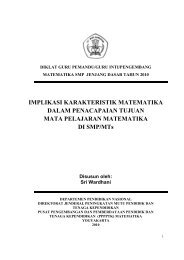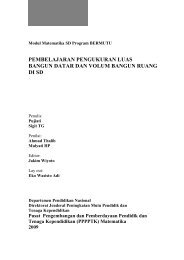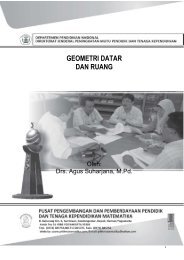25 Biggest Mistakes Teachers Make and How to Avoid Them
25 Biggest Mistakes Teachers Make and How to Avoid Them
25 Biggest Mistakes Teachers Make and How to Avoid Them
You also want an ePaper? Increase the reach of your titles
YUMPU automatically turns print PDFs into web optimized ePapers that Google loves.
146 Personality <strong>and</strong> Professionalism<br />
discovered as being ADD. It really frustrates me still <strong>to</strong>day that my disability was not<br />
discovered until two years ago! <strong>How</strong>ever, I am dealing with it <strong>and</strong>, for the first time in<br />
college, I made an A on a test with the help of Ritalin, <strong>and</strong> last semester I got a 2.0—<br />
the closest I have ever gotten <strong>to</strong> a 3.0.<br />
Another experience was my junior year in high school <strong>and</strong> I was in Advanced<br />
Geometry, the first advanced class I ever attempted <strong>and</strong> I was studying with my mom<br />
<strong>and</strong> my boyfriend, C. After turning the homework in, C. <strong>and</strong> I both missed the same<br />
problems <strong>and</strong> he was a straight-A, advanced student <strong>and</strong> I was a B, C, regular student,<br />
<strong>and</strong> she called me a cheater!<br />
In third grade I visited the orthodontist over Christmas vacation <strong>and</strong> was fitted for a<br />
retainer. Anyone who has experienced this knows it can be humiliating, especially in the<br />
speech department. It takes some getting used <strong>to</strong>. When school resumed I was still<br />
having some difficulty. My teacher, obviously hoping <strong>to</strong> be awarded “teacher of the<br />
year” for noticing this defect, placed me with a speech pathologist.<br />
Trying <strong>to</strong> determine if a student<br />
has a learning disability<br />
or a physical disability is a difficult,<br />
sensitive process. <strong>Teachers</strong> should<br />
tread lightly in these areas, being<br />
careful not <strong>to</strong> misdiagnose, but tread<br />
they must, lest they miss a diagnosis<br />
or condition. Scenario 17.7 is a misdiagnosis.<br />
The teacher jumped <strong>to</strong> the<br />
erroneous conclusion that the student<br />
had speech difficulties <strong>and</strong> rem<strong>and</strong>ed<br />
the student <strong>to</strong> a speech pathologist<br />
without further investigation. If she<br />
had treaded lightly <strong>and</strong> talked <strong>to</strong> the<br />
student first or obtained further evidence<br />
of a problem, she could have<br />
avoided misdiagnosing the student.<br />
The teacher does deserve credit for<br />
trying <strong>to</strong> act on the student’s behalf.<br />
Scenario 17.6 is a case of missed<br />
diagnosis. For about twenty years,<br />
no one suspected the student had<br />
attention deficit disorder. This disorder<br />
is making its way <strong>to</strong> the forefront<br />
of research on exceptional learners,<br />
as increased knowledge of the disorder<br />
becomes available.<br />
Diagnosing attention deficit disorder<br />
(ADD) may be difficult because<br />
it mimics attention problems in other<br />
disorders (Slavin, 1994) <strong>and</strong> in some<br />
cases, children may have difficulty<br />
paying attention <strong>and</strong> not have ADD<br />
or any other disorder.<br />
To avoid missing a diagnosis of a<br />
disorder or misdiagnosing a disorder,<br />
effective teachers will proactively<br />
arm themselves with knowledge.<br />
They learn how <strong>to</strong> identify learning<br />
disabilities according <strong>to</strong> their school<br />
district’s rules, regulations, <strong>and</strong><br />
re quire ments. They learn characteristics<br />
of students with learning disabilities<br />
or physical challenges. They<br />
become knowledgeable of the legal<br />
ramifications of serving exceptional<br />
learners. Effective teachers tread<br />
lightly in recommending students for<br />
special education <strong>to</strong> avoid contributing<br />
<strong>to</strong> the disproportionate number<br />
of males <strong>and</strong> African Americans that<br />
are overrepresented in special education<br />
(U.S. Depart ment of Education,<br />
1991).





